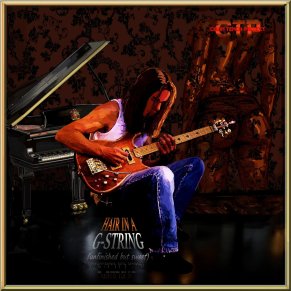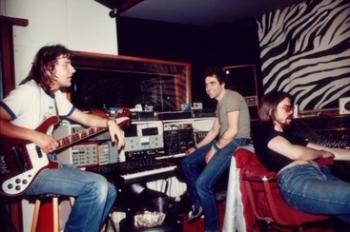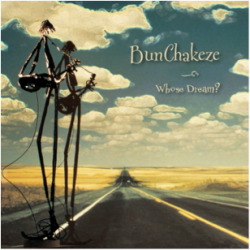Colin Tench Project

On September 30th of this year, Colin Tench released his long-awaited solo project album “Hair in a G-String (unfinished but sweet)”. I call it a solo project because he usually plays in a band called Corvus Stone where everyone contributes to the music creation; all four members come up with their own bits. Colin has played lead guitar on a few other album’s like “The Road to Avalon” by Blake Carpenter’s Minstrel’s Ghost, “The Road to Mingulay” by Andy John Bradford’s Ocean’s 5, and most recently on “Bridge Across Time” by Steve Gresswell’s Coalition (with Blake Carpenter). But this “Hair in a G-String” is a Colin Tench album, with all the music and much of the lyrics created by him.
No. Not quite. Let me correct that. The music was created by Mr. Tench but a rather lengthy list of people (25 I counted including Colin) contributed with some of them building on the music that was created while others – namely Phil Naro and Peter Jones – contributed lyrics to some tracks.
CTP for short (and not to be confused with the Christian Tolle Project) has culminated in an album that can best be described as entertaining and enjoyable. The music is varied and wonderfully composed, performed, and produced. Some of the lyrics are very clever and beautiful while others are quite amusing. It’s an album of progressive music but not in an exceptionally technical way nor in a grandiose fashion. It’s an album of melodic rock in a manner reminiscent of the classic days when melodic rock was a pop radio staple. Though the primary influences would seem to be Genesis, Queen, ELO, and even Santana, one can pick out some Pink Floyd and even a touch of Iron Maiden, plus as many other artists are you care to find. Rumours of both Sir George Martin and Spike Milligan being channeled on this album add to the intrigue. It’s an album of serious music (mostly) not to be taken too seriously (mostly).
The stories behind this album’s creation are interesting. It began way back around 2010/11. Colin had played in a band called BunChakeze (say bunch-of-keys) in the 80’s and they had recorded an album’s worth of material that was never released. After a 25-year hiatus from guitar playing, Colin got in touch with Pasi Koivu, a keyboard player and composer in Finland. Pasi recommended releasing the BunChakeze album. Around this time, Colin decided to pick up a guitar and see if he could still come up with something. What resulted was an instrumental piece that was comprised of some material from BunChakeze, some new ideas, and a little bit of stuff borrowed from elsewhere. The final composition was entitled, “Something Old, Something New, Something Borrowed, Something Screwed”. Shortly after, Pasi asked Colin to play guitar for a piece he was working on called, “Iron Pillows”. This collaboration was the beginning of Corvus Stone. The guitar instrumental was the beginning of CTP.
Colin became very occupied with chatrooms and through these he came in contact with several people who would become instrumental in his sudden and rapid career development: Sonia Mota (artist), Blake Carpenter (singer), Steve Gresswell (multi-instrumentalist and composer), Stef Flaming (multi-instrumentalist and composer and singer for Murky Red), Andres Guazzelli (composer), Andy John Bradford (folk singer and composer), Oliver Rusing (multi-instrumentalist, composer, and producer) and several others too. From 2011 to 2015, Colin would not only go on to release two Corvus Stone albums and one album of remixed tracks and new tracks, but he would appear on a few other albums playing lead guitar and guest on a few more like KariBow’s “Holophinium”, United Progressive Fraternity’s “Fall in Love with the World”, Marco Ragni’s “Land of Blue Echoes”, and Grandval’s “A ciel ouvert”. During all of this, Colin had let singer Phil Naro (who appears on a few Corvus Stone songs) hear “Something Old…” and he took part of the track and recorded vocals with his own lyrics. This became the basis for “Can’t Have It Any Other Way”, the second track on “Hair in a G-String”.
After Corvus Stone “Unscrewed”, Colin decided to work on his solo project in earnest. “The Mad Yeti” was a demo that he had created earlier after buying a microphone called Yeti. This along with other working demos were available on Melodic Revolution Records’ web site. Colin picked up a piece he was working on called “Hair in a G-String” (a title inspired by “Air on a G-String”) and decided to see where he could take it. He also composed a piece called “The Sad Brazilian” which he put on YouTube. Meanwhile in Buffalo, U.S.A., Gordon Bennett, a fellow musician on the United Progressive Fraternity album, found Colin’s Brazilian and pilfered it. Gordo, a very talented guitarist in his own right, went ahead and added orchestral arrangements to the Brazilian and then sent the whole thing back to Colin with a “hope you don’t mind but…” type of a notice. Colin did not mind one bit. Gordo’s contribution had been to enhance the music rather than go over it. Colin was thrilled. Gordo was invited to join the project.
The timing couldn’t have been better. Steve Gresswell, who had provided orchestration for what was to become “Hair in a G-String part 1 (The Opening)”, was becoming busy with his latest recording project, Coalition’s new album “Bridge Across Time”. Gordo was put in charge of most of the rest of the orchestration to appear on the album. Other important names to appear were Phil Naro (vocals and lyrics on two tracks), Vic Tassone (drummer for Unified Past), Oliver Rusing on drums (Oliver commented that he was given the music and with no click track, he had to add his drums and percussion), Ian Beabout on flute for “Lisa’s Entrance Unplugged”, drummer Jay Theodore McGurrin, Petri Lindstrom on bass (Corvus Stone, Saturn Twilight, Progeland, Petri Lindstrom Project, etc.) and a host of others. The biggest addition to the album however had to be Peter Jones of Tiger Moth Tales and Red Bazar.
Peter Jones not only brought his talents as a vocalist and a multi-instrumentalist (he plays a clarinet and a saxophone solo on the album) but also as an improvisational mad man. Though Colin’s lyrics were at times zany enough, Peter was free to interpret them as he liked and add things when he felt inspired to do so. Thus we get the lines, “Put them together and what do you get?/ Goodety goodety good!” Peter also contributes a minion vocal break near the end.
Peter’s serious side can be heard on the first single, “And So Today”. He sings with passion and sentiment on this song about the passing of some of our musical heroes in this past year. It’s a beautiful and touching song.
The album became available on CD in early November and there are plans for a vinyl release of the “Hair in a G-String” parts, “The Sad Brazilian”, and “And So Today”. There is also a bonus track with the download that will not be on the CD and that is Gordo’s orchestral work on “Lisa’s Waltz with full orchestra”, a phenomenal piece on its own.
Currently ranking on the top of several prog lists including CD Baby and Prog Archives, the album received a favourable review in Prog Magazine as well. Colin will be the first to tell you though that this was indeed a band effort. Every single contribution helped make this album the success that it is.

 Colin Tench had been an avid listener to music since a very young age; however, the thought of becoming a professional musician was not something he dwelled on with any degree of seriousness. Originally from England, Colin went to live in Sydney for three years and spent 11 months backpacking across Asia. During his stay in Sydney he began learning to play the guitar. He joined a band alongside some other blokes who were either from England or who had English parents, and they called themselves The Pommie Gentlemen. This humorous appellation would presage Colin’s approach to music in the distant future. The band played parties and joined Battle of the Bands, but by Colin’s own admission they were not particularly good. (An interesting footnote is that the drummer ended up playing on two tracks of Corvus Stone’s debut three decades later!) His band did, however, discover AC/DC’s original vocalist, Bon Scott in the audience one night.
Colin Tench had been an avid listener to music since a very young age; however, the thought of becoming a professional musician was not something he dwelled on with any degree of seriousness. Originally from England, Colin went to live in Sydney for three years and spent 11 months backpacking across Asia. During his stay in Sydney he began learning to play the guitar. He joined a band alongside some other blokes who were either from England or who had English parents, and they called themselves The Pommie Gentlemen. This humorous appellation would presage Colin’s approach to music in the distant future. The band played parties and joined Battle of the Bands, but by Colin’s own admission they were not particularly good. (An interesting footnote is that the drummer ended up playing on two tracks of Corvus Stone’s debut three decades later!) His band did, however, discover AC/DC’s original vocalist, Bon Scott in the audience one night.





 It’s hard to imagine a musician with more irons in the fire than Colin. In addition to playing guitar and writing music, Colin also mixes, something he learned to do after he was not happy with the engineer’s job on an Oceans 5 recording, and has learned web page design. Once there was a time when bands had money and hired people to do these things. Now Colin, along with support from his trusted musician friends in Murky Red and painter Sonia, does a lot of different things for maintaining his band projects.
It’s hard to imagine a musician with more irons in the fire than Colin. In addition to playing guitar and writing music, Colin also mixes, something he learned to do after he was not happy with the engineer’s job on an Oceans 5 recording, and has learned web page design. Once there was a time when bands had money and hired people to do these things. Now Colin, along with support from his trusted musician friends in Murky Red and painter Sonia, does a lot of different things for maintaining his band projects.
